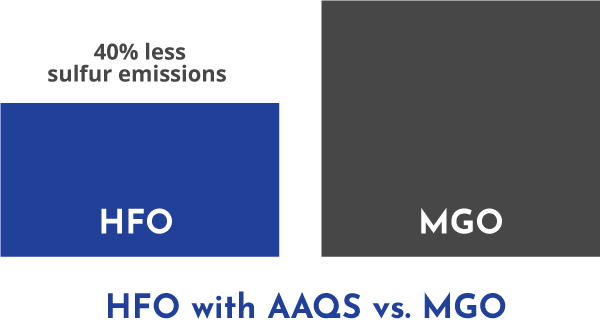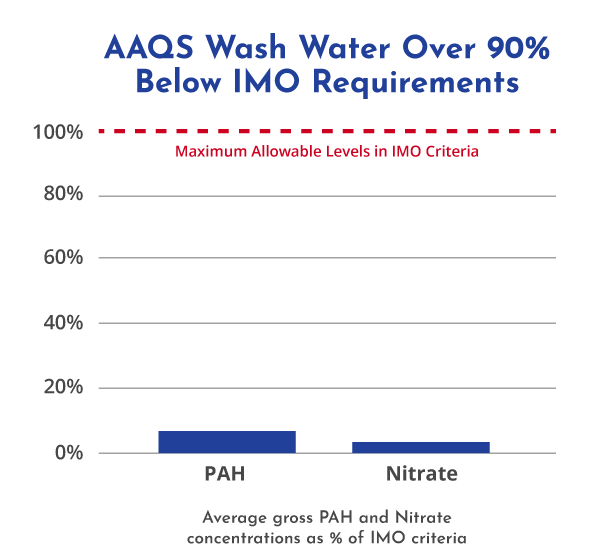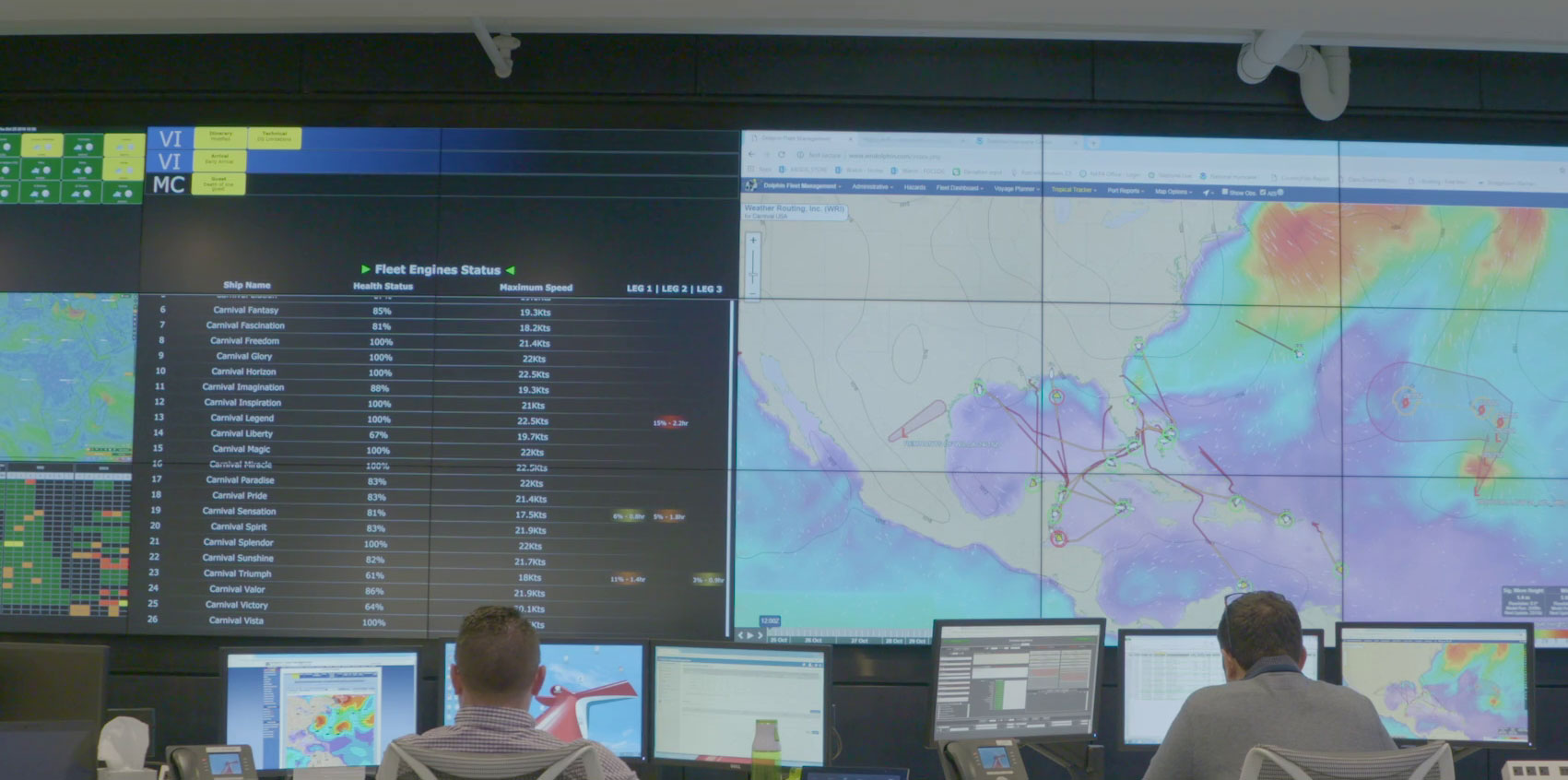Carnival Corporation's
Advanced Air Quality Systems
learn more
What is an Advanced Air Quality System or “Scrubber”?
Scrubbers – A Clean Solution for Air and Water
Advanced Air Quality Systems (AAQS), commonly referred to as exhaust gas cleaning systems or “scrubbers,” are a significant technological innovation designed to improve air emissions, meet and exceed environmental regulatory standards and support sustainable operations in the global shipping industry.
Advanced Air Quality Systems are an important part of Carnival Corporation’s strategy to improve air quality in port and at sea, a strategy that also includes the use of liquefied natural gas (LNG), shore power and marine gasoil (MGO). By enabling ships to use heavy fuel oil (HFO) and treat it in a way that significantly improves air emissions, Advanced Air Quality Systems provide a safe and effective solution for compliance with International Maritime Organization (IMO) 2020 regulations, while meeting international air and water quality standards.
Carnival Corporation weighed many factors before choosing to pioneer the use of Advanced Air Quality Systems in the small confines of a cruise ship to comply with the upcoming IMO 2020 global sulfur regulations. Under these new regulations, as of January 2020, all ships must utilize fuel oil with a sulfur content of 0.50 percent m/m (mass by mass), or use approved equivalent methods like scrubber systems to meet the sulfur oxide (SOx) emission requirements. As part of its overall environmental compliance strategy, Carnival Corporation chose to utilize Advanced Air Quality Systems across much of its fleet based on the ability to significantly improve air quality and outperform MGO in many ways, while continuing its commitment to meet and often exceed all applicable international environmental regulatory standards.
To date, Carnival Corporation has invested over $500 million in the development, testing and deployment of Advanced Air Quality Systems. As of 2024, the company has 80 ships fitted with Advanced Air Quality Systems covering 94% of its non-LNG fleet. Because cruise ships operate on several engines, multiple scrubbers are often installed on each ship.
To learn more about Carnival Corporation’s Advanced Air Quality Systems, click here.
A Proven & Effective Solution for Cleaner Emissions

Advanced Air Quality Systems have the proven capability to outperform low-sulfur fuel alternatives such as MGO, providing overall cleaner air emissions in a way that is safe and effective for ocean environments. Results of extensive testing show that ships using Advanced Air Quality Systems produce emissions lower in sulfur and particulate matter (PM) than those running on low-sulfur MGO, a fuel consisting exclusively of distillates that is considered the benchmark for the IMO 2020 0.50 percent sulfur cap restriction.
In keeping with even the highest international standards, Advanced Air Quality Systems remove 99 percent of sulfur and 60 to 90 percent of PM from engine emissions, including elemental and organic carbon. It also reduces nitrogen oxides by 10 percent. Research shows Advanced Air Quality Systems are especially effective in capturing small-size PM (10 and 2.5 microns and ultrafine), while removing most of the soot from airborne distribution, including black carbon.
In late 2018, Carnival Corporation and the EPA received the results of the latest rounds of extensive exhaust emissions tests of the company’s Advanced Air Quality Systems. The results are consistent with the major published research on this subject, such as a 2014 study by researchers in Sweden, Kent Salo and Erik Fridell, which concluded that scrubbers on ships using HFO can lower PM to a level below that of MGO.
Because marine diesel engines were factory-configured for HFO, they are less efficient on MGO, leading to more CO2 released per unit kW power generated. HFO requires less refining than highly-refined MGO, which also means less greenhouse gas created during production. HFO also has a lower combustion temperature than MGO, resulting in less nitrous oxides (NOx) production at sea.
Ships operating with Advanced Air Quality Systems have the benefit of removing sulfur from fuel – keeping it from being released into the air – and returning it to the sea, which is the world’s primary natural reservoir for sulfur. The end result of the Advanced Air Quality Systems process is sulfur dioxide (SO2) being converted into water (H2O), air (CO2) and sulfate (SO4), a compound that is naturally occurring in abundance in seawater.
To learn more about the environmental performance of Carnival Corporation’s Advanced Air Quality Systems, click here.
Performance Results
All Advanced Air Quality Systems comply with international regulations and are inspected by a classification society and certified by the ship’s flag administration. In addition, all systems utilize continuous monitoring equipment to automatically record all required parameters.
Advanced Air Quality Systems ensure that Carnival Corporation ships are in compliance with all relevant environmental regulations, including the IMO 2020 requirements.
The IMO, via strict guidelines from its Marine Environmental Protection Committee (MEPC), requires ships to monitor air and water emissions to safeguard against air and water environmental impacts:
- To measure and record SO2 levels in the engine exhaust, a gas analyzer is installed above each Advanced Air Quality Systems tower to ensure 24/7 monitoring. Performance of the Advanced Air Quality Systems is constantly adjusted by automation to remain well within the regulatory SO2 limits.
- IMO MEPC guidelines require that Advanced Air Quality Systems wash water be continuously measured and recorded for three parameters: pH, turbidity and polycyclic aromatic hydrocarbons (PAH). This data is collected in three locations – the inlet, after the tower and before discharge – and is required to be kept onboard for no less than 18 months.
- IMO also encourages periodic monitoring to test for additional parameters with spot samples, using measurement techniques that are more advanced than those possible to achieve during continuous monitoring.

Meeting Strict Water Quality Standards
An independent, two-year scientific study of Advanced Air Quality Systems wash-water samples concluded that Carnival Corporation ships operating with Advanced Air Quality Systems consistently meet and in some cases outperform the industry benchmarks established by organizations such as the IMO, European Union (EU) and the U.S. Environmental Protection Agency (EPA). The wash water from these systems is also well below the limits set by several major national and international water quality and land-based water discharge standards, even when compared to criteria like drinking water.
Specific to the study regarding IMO wash-water requirements, DNV GL, one of the world’s leading classification societies and recognized advisor for the maritime industry, analyzed the laboratory test data and confirmed results from previous studies showing the quality of the water used in the Advanced Air Quality Systems process was always far below the IMO monitoring limits for polycyclic aromatic hydrocarbons (PAHs) and the annual limits for nitrates. In fact, when measured against IMO standards, the average wash-water test results in this study were over 90 PERCENT lower than maximum allowable levels. In many cases, the materials were completely undetectable in the laboratory testing process.
To read the full study, click here. To learn more about the environmental performance of Carnival Corporation’s Advanced Air Quality Systems, click here.
Carnival Corporation’s AAQS Adoption
Exhaust gas cleaning systems (EGCS) like Advanced Air Quality Systems have been used for decades on land as a proven and effective way to significantly reduce sulfur oxide (SOx) and particulate matter produced by an engine’s operation. Carnival Corporation is a forerunner in adapting this technology for maritime use within the confined space of a cruise ship, beginning to test, measure and modify Advanced Air Quality Systems prototypes beginning in 2006.
To further enhance its emissions profile, Carnival Corporation developed a catalytic filter for its engine exhaust to further reduce particulate matter before exhaust reaches the Advanced Air Quality Systems. Its standard Advanced Air Quality System then removes more than 98 percent of sulfur and between 60 and 90 percent of the particulate matter, including organic, elemental and black carbon. The combination of Advanced Air Quality Systems, catalytic filter and other systems all contribute to reduction of particulate matter, including the very fine PM 10- and 2.5-micron particles, with some reduction also of nitrogen oxides (NOx).
Given that a cruise ship operates on several engines, multiple scrubbers are often installed on each ship. As of 2024, the company has 80 ships fitted with Advanced Air Quality Systems covering 94% of its non-LNG fleet.
In 2018, Carnival Corporation was a founding member of Clean Shipping Alliance 2020, a new industry association of shipping and maritime leaders that provides education and information on the benefits of Advanced Air Quality Systems. Collectively, these companies represent over 2,000 ships across the sectors of commercial shipping and cruising.
Fuel Solutions for Sustainability
Advanced Air Quality Systems are a key component of Carnival Corporation’s 2020 sustainability goals, first outlined in 2015 and updated in summer 2018. Coupled with other complementary technologies with ecological advantages, including launching the world’s first-ever cruise ships powered in port or at sea by liquefied natural gas (LNG), the world’s cleanest burning fossil fuel, and promoting the use of shore power, Advanced Air Quality Systems will help the company meet its aggressive carbon reduction and other sustainability goals, as well as all applicable regulations for the over 800 ports and destinations Carnival Corporation ships visit each year.
As an early mover and industry leader in the development and installation of Advanced Air Quality Systems, LNG and shore power operations, Carnival Corporation saw a complementary role for each solution in its strategic sustainability plan – with LNG seen as most appropriate for newbuilds due to major required design changes, and Advanced Air Quality Systems the preferred choice for retrofitting to the existing fleet.
In December 2018, the company launched the first cruise ship in the world capable of running on LNG both in port and at sea. As of 2024, the company now leads the industry with 10 LNG-enabled cruise ships in operation and six more on order, sailing for AIDA Cruises, Costa Cruises, Carnival Cruise Line, Princess Cruises and P&O Cruises (UK).
As an additional measure to improve the company’s air emissions, 70% of the Carnival Corporation fleet is equipped as of 2024 with what is called “cold-ironing” capability, or the ability to use available shoreside electric power when docked.
Carnival Corporation & Its Commitment to Sustainability
As the world’s largest leisure travel company and world’s largest cruise company, Carnival Corporation recognizes the importance of sustainability as a critical part of how the company and its global cruise lines conduct business. With over 160,000 team members representing approximately 150 countries around the world – most of whom live and work at sea – Carnival Corporation has a deep commitment to protecting and maintaining clean air and healthy oceans and communities in the 800 ports and destinations its ships visit each year.
Carnival Corporation’s portfolio includes more than 90 ships sailing for its portfolio of world-class cruise lines: AIDA Cruises, Carnival Cruise Line, Costa Cruises, Cunard, Holland America Line, P&O Cruises (Australia), P&O Cruises (UK), Princess Cruises, and Seabourn.
